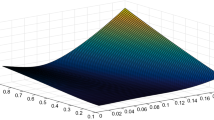Abstract
We propose a new efficient method of calibrating agent-based models using the Method of Simulated Moments. It utilizes the Filtered Neighborhoods optimization algorithm, gradually narrowing down the search area by examining local neighborhoods of promising solutions. The new method obtains better calibration accuracy for a benchmark financial agent-based model in comparison to a broad selection of other methods, while using just a tiny fraction of their computational budget.
Access this chapter
Tax calculation will be finalised at checkout
Purchases are for personal use only
Similar content being viewed by others
Notes
- 1.
The notions of “calibration” and “validation” of HAMs do not have unambiguous definitions. Here they are used broadly, designating a process of arriving at HAM parameter values that provide the best fit of model output to some reference series.
- 2.
Search ranges for all parameters need to be scaled in the same way first.
References
Barde, S.: A practical, accurate, information criterion for Nth order Markov processes. Comput. Econ. 50(2), 281–324 (2016). https://doi.org/10.1007/s10614-016-9617-9
Bergstra, J., Bengio, Y.: Random search for hyper-parameter optimization. J. Mach. Learn. Res. 13, 281–305 (2012)
Brochu, E., Cora, V.M., de Freitas, N.: A tutorial on Bayesian optimization of expensive cost functions, with application to active user modeling and hierarchical reinforcement learning. CoRR abs/1012.2599 (2010)
Brock, W.A., Hommes, C.H.: Heterogeneous beliefs and routes to chaos in a simple asset pricing model. J. Econ. Dyn. Control 22, 1235–1274 (1998). https://doi.org/10.1016/S0165-1889(98)00011-6
Chen, J., Xin, B., Peng, Z., Dou, L., Zhang, J.: Optimal contraction theorem for exploration-exploitation tradeoff in search and optimization. IEEE Trans. Syst. Man Cybern. Part A Syst. Hum. 39(3), 680–691 (2009). https://doi.org/10.1109/TSMCA.2009.2012436
Chen, S.H., Chang, C.L., Du, Y.R.: Agent-based economic models and econometrics. Knowl. Eng. Rev. 27(2), 187–219 (2012). https://doi.org/10.1017/S0269888912000136
Chen, Z., Lux, T.: Estimation of sentiment effects in financial markets: a simulated method of moments approach. Comput. Econ. 52(3), 711–744 (2016). https://doi.org/10.1007/s10614-016-9638-4
Dieci, R., He, X.Z.: Heterogeneous agent models in finance. In: Hommes, C., LeBaron, B. (eds.) Handbook of Computational Economics, vol. 4, chap. 5, pp. 257–328. Handbooks in Economics, Elsevier (2018). https://doi.org/10.1016/bs.hescom.2018.03.002
Dutang, C., Savicky, P.: randtoolbox: Generating and Testing Random Numbers (2020). R package version 1.30.1
Ellen, S., Verschoor, W.F.C.: Heterogeneous beliefs and asset price dynamics: a survey of recent evidence. In: Jawadi, F. (ed.) Uncertainty, Expectations and Asset Price Dynamics. DMEEF, vol. 24, pp. 53–79. Springer, Cham (2018). https://doi.org/10.1007/978-3-319-98714-9_3
Fagiolo, G., Guerini, M., Lamperti, F., Moneta, A., Roventini, A.: Validation of agent-based models in economics and finance. In: Beisbart, C., Saam, N.J. (eds.) Computer Simulation Validation. SFMA, pp. 763–787. Springer, Cham (2019). https://doi.org/10.1007/978-3-319-70766-2_31
Grazzini, J., Richiardi, M.G., Tsionas, M.: Bayesian estimation of agent-based models. J. Econ. Dyn. Control 77, 26–47 (2017). https://doi.org/10.1016/j.jedc.2017.01.014
He, X.Z.: Recent developments in asset pricing with heterogeneous beliefs and adaptive behaviour of financial markets. In: Bischi, G., Chiarella, C., Sushko, I. (eds.) Global Analysis of Dynamic Models in Economics and Finance: Essays in Honour of Laura Gardini, pp. 3–34. Springer, Berlin (2013). https://doi.org/10.1007/978-3-642-29503-4_1
Hommes, C.H.: Heterogeneous agent models in economics and finance. In: Tesfatsion, L., Judd, K.L. (eds.) Handbook of Computational Economics, vol. 2, chap. 23, pp. 1109–1186. Handbooks in Economics, Elsevier (2006). https://doi.org/10.1016/S1574-0021(05)02023-X
Hong, H.S., Hickernell, F.J.: Algorithm 823: implementing scrambled digital sequences. ACM Trans. Math. Softw. 29(2), 95–109 (2003). https://doi.org/10.1145/779359.779360
Klein, A., Falkner, S., Bartels, S., Hennig, P., Hutter, F.: Fast Bayesian Optimization of Machine Learning Hyperparameters on Large Datasets. In: Singh, A., Zhu, J. (eds.) Proceedings of the 20th International Conference on Artificial Intelligence and Statistics. Proceedings of Machine Learning Research, vol. 54, pp. 528–536. PMLR, Fort Lauderdale (2017)
Knysh, P., Korkolis, Y.: Blackbox: a procedure for parallel optimization of expensive black-box functions. CoRR abs/1605.00998 (2016)
Kukacka, J., Barunik, J.: Estimation of financial agent-based models with simulated maximum likelihood. J. Econ. Dyn. Control 85, 21–45 (2017). https://doi.org/10.1016/j.jedc.2017.09.006
Lamperti, F.: An information theoretic criterion for empirical validation of simulation models. Econom. Stat. 5, 83–106 (2018). https://doi.org/10.1016/j.ecosta.2017.01.006
LeBaron, B.: Agent-based computational finance. In: Tesfatsion, L., Judd, K.L. (eds.) Handbook of Computational Economics, vol. 2, chap. 24, pp. 1187–1233. Handbooks in Economics, Elsevier (2006). https://doi.org/10.1016/S1574-0021(05)02024-1
Lux, T., Zwinkels, R.C.J.: Empirical validation of agent-based models. In: Hommes, C., LeBaron, B. (eds.) Handbook of Computational Economics, vol. 4, chap. 8, pp. 437–488. Handbooks in Economics, Elsevier (2018). https://doi.org/10.1016/bs.hescom.2018.02.003
Platt, D.: A comparison of economic agent-based model calibration methods. J. Econ. Dyn. Control 113 (2020). https://doi.org/10.1016/j.jedc.2020.103859
Rakshit, P., Konar, A., Das, S.: Swarm and evolutionary computation. J. Am. Stat. Assoc. 33, 18–45 (2017). https://doi.org/10.1016/j.swevo.2016.09.002
Shahriari, B., Swersky, K., Wang, Z., Adams, R.P., de Freitas, N.: Taking the human out of the loop: a review of Bayesian optimization. Proc. IEEE 104(1), 148–175 (2016). https://doi.org/10.1109/JPROC.2015.2494218
Snoek, J., Larochelle, H., Adams, R.P.: Practical Bayesian optimization of machine learning algorithms. In: Pereira, F., Burges, C.J.C., Bottou, L., Weinberger, K.Q. (eds.) Advances in Neural Information Processing Systems, vol. 25, pp. 2951–2959. Curran Associates, Inc. (2012)
Author information
Authors and Affiliations
Corresponding author
Editor information
Editors and Affiliations
Rights and permissions
Copyright information
© 2021 Springer Nature Switzerland AG
About this paper
Cite this paper
Zegadło, P. (2021). Efficient Calibration of a Financial Agent-Based Model Using the Method of Simulated Moments. In: Paszynski, M., Kranzlmüller, D., Krzhizhanovskaya, V.V., Dongarra, J.J., Sloot, P.M. (eds) Computational Science – ICCS 2021. ICCS 2021. Lecture Notes in Computer Science(), vol 12744. Springer, Cham. https://doi.org/10.1007/978-3-030-77967-2_27
Download citation
DOI: https://doi.org/10.1007/978-3-030-77967-2_27
Published:
Publisher Name: Springer, Cham
Print ISBN: 978-3-030-77966-5
Online ISBN: 978-3-030-77967-2
eBook Packages: Computer ScienceComputer Science (R0)




